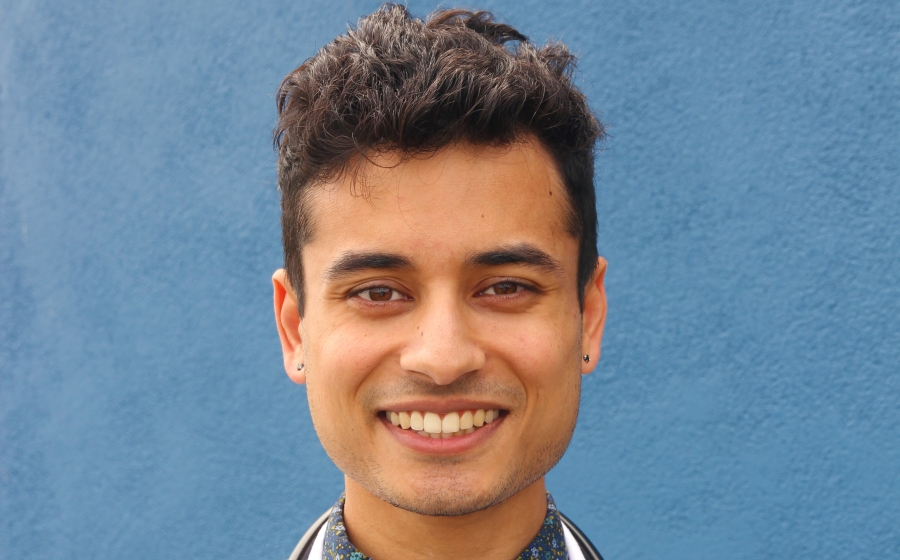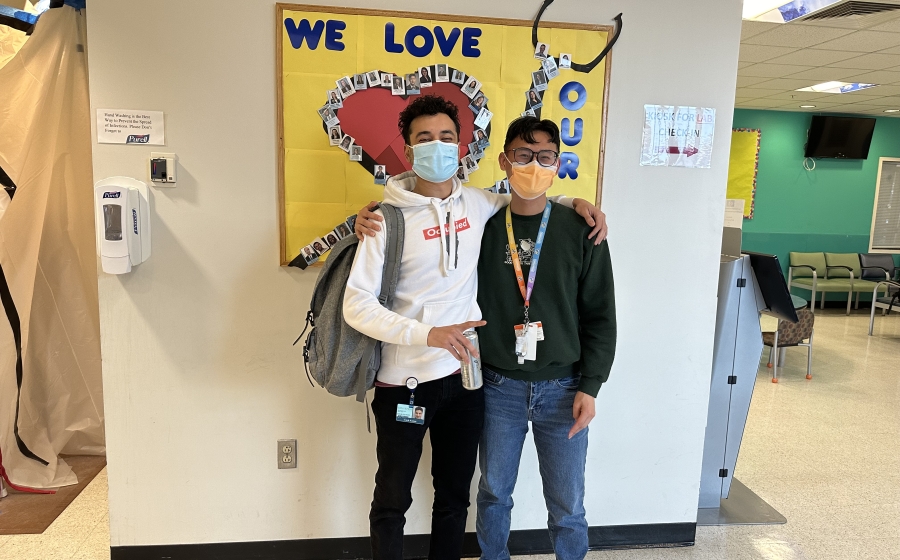March 2024
Ayush Kumar
Bloomberg School of Public Health
Congratulations to our Star of the Month for March 2024, Ayush Kumar from the Bloomberg School of Public Health! Ayush has been active in our community all year through various programs, serving as HIV Counselor and Tester at Harriet Lane Clinic, and collaborating on a Baltimore Action Project with The Pride Center of Maryland. Read our interview below to learn more about his experience with service-learning and volunteering in our community!

Tell us about yourself! What brought you to the Bloomberg School of Public Health?
When I was a kid, my dad was diagnosed with a life-altering condition. He was a proud man, always had been. “Don’t overshare, we’re fine,” he’d say as he and my mom struggled to manage finances and multitudes of doctors’ appointments. But it was the realities of my dad’s condition in the context of an inequitable healthcare system that nurtured his inner advocate. Fire trumped stoicism as he brought me along what became our regular three-and-a-half-mile route to City Hall for town meetings. I didn’t recognize the man next to the lectern as he laid his problems bare in appeals for things like disability-conscious public transportation and accessible walk buttons at intersections. On the journeys home, he would let me climb onto the back of his motorized wheelchair as he propelled us along at speeds I wouldn’t be able to keep up with. As wind gently tousled my hair and the Central Valley heat beat down on me, he would explain how he was coming to realize that his health and well-being demanded more than just a fistful of prescriptions and physical therapy. There were aspects that need to be addressed at a community level. Now I find myself as an MPH candidate at Hopkins, on a gap year from earning an MD at UCSF.
Can you share a little background your experience in the Baltimore community through your work with SOURCE? What made you want to get involved and what work are you doing?
I moved through life with a dream of being a community-based physician and grassroots organizer. When I realized my medical school education wasn’t going to teach me what I needed to know to fully realize that dream, I turned to an MPH. I chose Hopkins specifically because of SOURCE. In all my reading and research, I didn’t come across a single program or department that was approaching community-based public health with the same degree of awareness or robustness that SOURCE was. I remember telling Sequean at orientation that I was invested in being a community member first, and a Hopkins student second. He had probably heard that a million times before – but since then, I’ve been chosen as a SOURCE governing board member, gotten the opportunity to be an HIV Counselor and Tester at Harriet Lane Clinic, and been selected for a Baltimore Action Project with the Pride Center of Maryland. Each opportunity, while unique in it’s own way, has provided me an opportunity to build my own little community in Baltimore composed not just of people in academia and healthcare workers, but organizers, activists, and locals. These are the people who are making tangible differences in their communities, and they’re who I wanted to learn from from the jump. I don’t think I would have gotten nearly as robust of an opportunity to do that if it hadn’t been for my involvement with SOURCE.
Can you share some more details about the HIV Counseling and Testing program and what it entails?
The HIV Counseling and Testing program is part of the Harriet Lane Clinic’s reproductive and sexual health program. The clinic itself is a primary care clinic that serves people from birth to 25 who come primarily from marginalized/low-income neighborhoods and subsequently tend to face disproportionate levels of health and healthcare disparities. The program aims to reduce some of those disparities by ensuring access to care for uninsured/underinsured folks and/or those requiring confidential care. Specific to reproductive and sexual health aims is universal and routine HIV testing, linking to HIV treatment or PrEP services, family planning, and counseling services.
The program has a lot to offer for those that are interested – it’s an opportunity to work with a great group of highly motivated people (shouts out to my supervisor, Yeng!), a stark reminder of the health and healthcare disparities that exist, a learning opportunity in regards to healthcare delivery, and a humbling moment each time you read a test and realize that the result has the potential to change a life.
"Each opportunity, while unique in it’s own way, has provided me an opportunity to build my own little community in Baltimore composed not just of people in academia and healthcare workers, but organizers, activists, and locals. These are the people who are making tangible differences in their communities, and they’re who I wanted to learn from from the jump."
What service activities do the organizations you’re involved with have planned in the future? Are there any activities where others can get involved?
As part of my Baltimore Action Project with the Pride Center of Maryland, we’re organizing a summit on Healthcare Disparities among the Sexual and Gender Minority Community, so be on the lookout for information on that! I’m also Secretary of the JB Grant Global Health Society and helped to secure a Community Service Grant that we are going to use to launch our Cultural Culinary Journey initiative at a local after-school program soon. I believe we may be looking out for volunteers so keep an eye out for that as well.
I also happen to be one of the Directors of Partnerships and Events with the Food Security Coalition, so besides our regular food pantry hours that you can volunteer at, I’ll be working hard on planning a few events to end the academic year strong. If anyone is interested in any of the programs I mentioned, you should know that SOURCE holds routine applications and interviews for it’s governing board from across the School of Medicine, Public Health, and Nursing. I believe the HIV Counseling and Testing program also takes applications yearly around the fall season. The Baltimore Action Projects similarly take applications yearly around the fall season.
How does your community work complement what you’re learning in the classroom at the School of Public Health?
I think there’s always going to be a disconnect between what you’re learning in the classroom and translating it to work out in the community, or vice versa. It’s one thing to learn theory and be an intellectual and another thing to see it all play out in real life; the expectations, what holds value and what doesn’t, and the procedures just differ at least a little. That being said, I have found concepts from my Introduction to Community-Based Participatory Research course and my Qualitative Research Theory and Methods course to have played a role in some of the work that I’ve done thus far, particularly in my work with the Pride Center. I look forward to a few more courses that I’ll be taking to wrap up the program, like Health Advocacy as well as Implementation and Sustainability of Community Based Health Programs to lend me even more insight.

What advice would you give to other students looking to engage in service-learning in Baltimore?
I think what you’re going to realize, especially if you have a background in community work outside of the influence of academia, is that a lot of the service-learning opportunities that will be presented to you won’t exactly match what you’ve experienced out and about. In my experience, these sorts of partnerships arise naturally when you’ve spent a considerable amount of time already with a community-based organization. But because of the nature of these graduate degree programs, we’re presented these opportunities where the project is pretty much picked out and you’re only meeting your potential partnering organization once or twice and being selected through an interview. For this reason, I’d say my biggest piece of advice is to get to know your site and your preceptor as early and thoroughly as possible. Be broad! Learn about the rest of the team, not just your preceptor. Learn about other work that is being done by the organization, not just the part relevant to you. If you focus on the people, the work will follow.
What is the most important experience you’ve had or thing you’ve learned?
There’s a famous quote by the activist Lilla Watson. “If you have come here to help me, you are wasting your time. But if you have come because your liberation is bound up with mine, then let us work together.” At the end of the day, the work that you will get involved in with the local community organizations and programs here more than likely impact your partners and the people they serve more than it does you. Partner for the right reasons. It’ll make it a more powerful experience for everyone involved.
